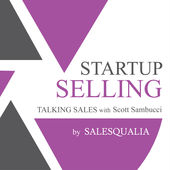23, 2017

Episode 32: The Cardinal Rules of Cold Emailing with Damian Thompson
 This episode of the Startup Selling Podcast focuses on cold email strategies and best practices when hiring and developing an early sales team.
This episode of the Startup Selling Podcast focuses on cold email strategies and best practices when hiring and developing an early sales team.
My guest is Damian Thompson, the Cofounder and Chief Customer Officer at LeadFuze, a company that provides automated lead generation software that helps B2B companies find leads and have more sales conversations automatically. Damian has led sales teams in a dozen countries, coaching 200+ professionals to more than $100 million in sales.
In this episode, Damian and I went DEEP into specific cold email outreach strategies.
Listen to the episode here:
Even better, why not subscribe to the “Startup Selling Podcast: Talking Sales with Scott Sambucci” on iTunes?
THE STARTUP SELLING PODCAST ON ITUNES
First, Damian talked about the mistakes of cold emailing that most startups make, most notably, taking a specific strategy they’ve read in a book and applying it directly to their company. That just never works. Damian talked about why you need to customize and build YOUR process for YOUR market and YOUR company.
Then Damian walked us through his “Cardinal Rules of Cold Emailing.”
Here are a few that we discussed:
1 – Passive-Aggressive SUCKS (my words…): Sending a second or third or fourth email to someone that read – “I haven’t heard back from you…” is really bad. It’s not the prospects fault they haven’t replied – it’s yours. Would you want to receive this email? Would you respond? How do you feel when you get these emails?
2 – Brevity: Assume email is read on mobile. Don’t use wasted words.
Bad: “I found you on Angel List…” or “I know you’re busy so I won’t take much time…”
3 – Don’t be apologetic: As Damian said – “If you target your market right, you’re offering something of value… They [your prospects] WANT to work with you.”
4 – Start your email with questions, then offer a quick value proposition then close with a call-to-action.
Ask yourself: What are the 1-2 biggest problems/pains of customers?
Reverse engineer biggest objections.
5 – Think low friction. The goal of your cold email should be to start a conversation. Don’t ask your prospects to call you or try to book a meeting right away. That’s too much to ask.
Be happy with ANY reply. There’s no such thing as a negative reply. If you’re getting NOTHING, that’s the worst outcome.
6 – Subject Lines Matter: Shorter is better. Five (5) words or less is ideal. Using the person’s first name or company name works really well.
It’s okay to be aggressive. Damian’s best-performing email subject line was “You’re doing it wrong,” but be sure to link subject lines to email’s content and ultimately, write emails that match your personality. If you’re just not comfortable being aggressive, do something else.
7 – Provide value in every interaction and outreach. Give prospects something quick that’s useful, and offer a few more ideas.
Once you nail your message and market, the find a way to do it a scale because, as Damian said “using Lead Generation to validate a market is a disaster.”
Remember that NO ONE buys for your TECHNICAL SOLUTION. Customers buy to increase revenue, reduce costs, o to get a promotion. There’s some other motivation, so find it and write to it.
Finally, we talked about building your sales team.
A few key ideas:
- “If you’re gonna hire one, you’ve gotta hire two.”
- You cannot hire someone to build your sales process. YOU have to define your sales process, THEN you can bring on your sales team.
- Once you hire, you’re going to spend more time, not less, doing sales.
- You cannot hire commission-only salespeople. It sends bad signals to the company.
- Align metrics and incentives directly to the outcomes you want out of that role. For example, paying an SDR based on long-term customer retention is really bad.
- Before you ask an employee to do something, ask yourself: “Have I done this successfully?”
- When hiring, it’s not about money for most SDR hires – your middle career salespeople care about money, but early hires want company and personal growth.
People & Mentions from this episode:
- Damian on LinkedIn
- Damian’s email: [email protected]
- Twitter: @damianthompson
- LeadFuze: Automated Lead Generation Software that helps B2B service companies find leads and have more sales conversations automatically.
- Stu Ungar
- Marylou Tyler: “Predictable Prospecting” [book]
- Episode 30: Predictable Prospecting: Target, Engage & Optimize Your Sales Funnel, and Why Introverts are the Best SalesPeople: An Interview with Marylou Tyler
- Episode 19: Sales Development Strategies with Trish Bertuzzi: The 40-second interview, Building a Beachhead & Being Direct with Customers
- David Ogilvy
- Paul Graham
- Pencils of Promise: A Global Education Organization that builds schools and provide quality educational programming to increase literacy rates in Ghana, Guatemala, Laos, and Nicaragua.

